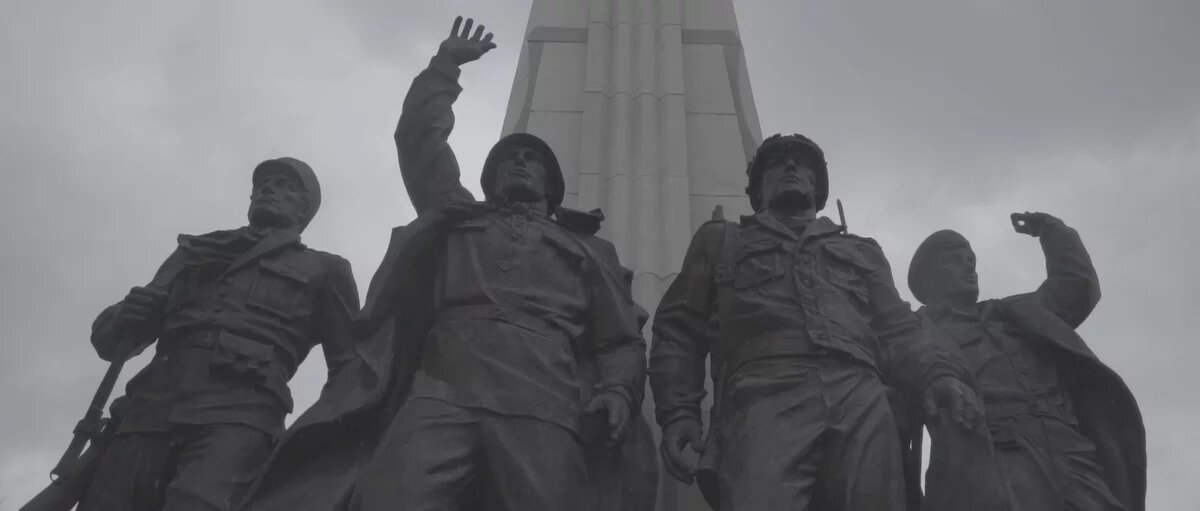"Different wars: National History Textbooks on the Second World War" - this was the title of a travelling exhibition by the EU-Russia Civil Society Forum. It toured 22 cities in the EU and Russia over the last four years. It showed how current textbooks for secondary schools depict the Second World War in Germany, Italy, Lithuania, Poland, Russia and the Czech Republic. The short film accompanying the exhibition will be released on 7 May.

In the memory of the nations of Europe, World War II remains one of the most painful and ambivalent memories. Current conflicts are embedded in history - and accordingly often history becomes a political tool. In order to understand the roots of today's conflicts, to discard prejudices and stereotypes, we have to deal with history. Especially today, in the face of massive changes and global change, we observe that people often dislike complex contexts and prefer a simple, plain picture of the past. The removal of the statue of Marshal Konev in Prague in April 2020 is a sad recent example and has triggered a dispute between the Czech Republic and Russia over the culture of remembrance.
Against this background, the EU-Russia Civil Society Forum has produced the nine-minute short film "Debate of Memories - 75 years after the end of the Second World War in Europe", which will be shown for the first time on 7 May 2020. The film was shot in three countries and at three places of remembrance, namely the Holocaust Memorial in Berlin, the Westerplatte Memorial in Gdansk and the Victory Museum in Moscow.
Germany's handling of the Nazi dictatorship is considered exemplary worldwide. In the past five years, however, Germany's culture of remembrance has been challenged by the right, and in 2017 AfD politician Björn Höcke described the Holocaust Memorial as a "monument of shame". In addition, there are also many in (post-)migrant society who have no relationship to this part of German history. Accordingly, there are tensions between those who are openly opposed to remembrance and a culture of remembrance and those who reject remembrance.
It is disturbing and outrageous that the "usual" way of dealing with the Nazi past is being questioned. At the same time, however, such discussions also ensure that interest in history is kept alive and that we must continue to talk anew about what what happened 75 years ago still means today. The anniversary gives us the opportunity to discuss once again what the end of the Nazi dictatorship, what the Holocaust means.
In Russia, World War II has been the most important instrument in political discourse for ten years, if not longer. In Russia, many believe that the West is playing down the role that the Soviet Union played in defeating the enemy.
In Russia, the commemoration of war is often a commemoration of victory, and this view is strongly promoted by the state, as well as by many other actors. The memory is complex and divided, because on the one hand Russia is huge and very many people took part in the war - each with very different memories. On the other hand, there is the public dealing with the past - in museums, in the cinema, on television and in speeches, and this official remembrance is in the foreground, which is why even people who think differently are often left with nothing but the official language of "Russia's great victory". This does not diminish the importance of victory, but war is much more complicated.
If one follows the editor-in-chief of the Polish magazine Przegląd Polityczny, the importance of the memory of World War II clearly diminishes. This becomes most obvious when looking at the EU. The founders of the EU did not see the community of states merely as an economic and social union, but rather wanted to revitalise democracy and prevent any new attempts to wage war in Europe. For the founders, the idea of a peace union and a zone of economic, social and political freedom was a central concern. Today, however, the memory of the Europe of before 1945, a Europe marked by rivalry between the great powers, has largely disappeared.
The dispute between Poland and Russia over the start of the Second World War is still omnipresent, and the refusal to invite the Russian President to the celebrations for the liberation of Auschwitz illustrates this.
The Second World War is not yet over - it continues as a struggle between rival, irreconcilable remembrance measures and remembrance cultures. In order to create a truly European culture of remembrance, we must, when it comes to our history, bid farewell to purely national perspectives. For this to succeed, we must, on the one hand, recognise and respect the fact that there are many different points of view and memories, and, on the other hand, we should use these many points of view to conduct a fruitful discussion about our common European past.
There will not be a single historiography, but it is important to talk about it, because it helps us to build bridges and overcome the trenches and walls that divide us.
The short film "The Controversy of Memories - 75 years after the end of the Second World War in Europe" is available from 7 May. here to see. It was produced by the EU-Russia Civil Society Forum as part of the Program "Remembering the past: history without borders"‟; Directed by Stefano di Pietro. The work of the Forum is currently supported by the European Union, the German Foreign Office, the Ministry of Foreign Affairs of the Netherlands and the OAK Foundation.
On 18 May the 9th European History Forum will take place on the same topic as a fishbowl talk on the net - information and registration here.
Translated from English by Bernd Herrmann.